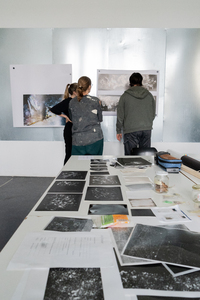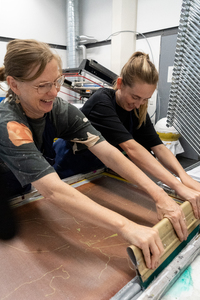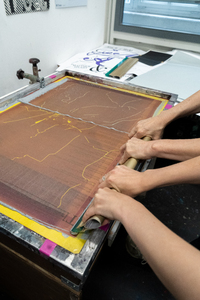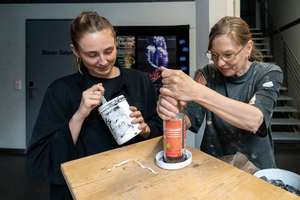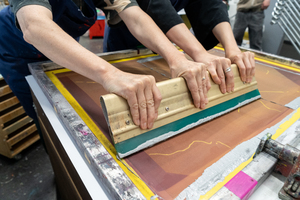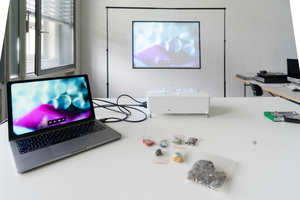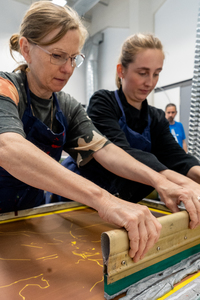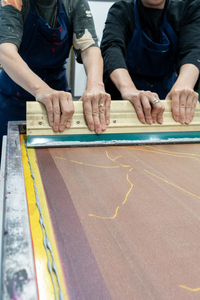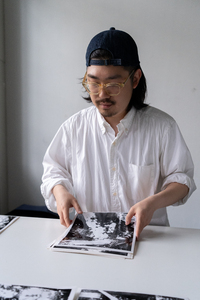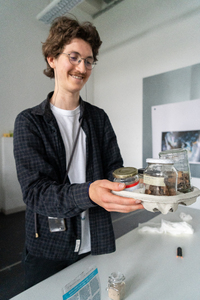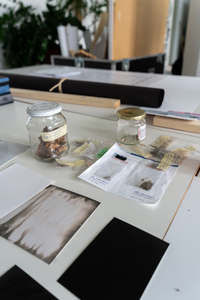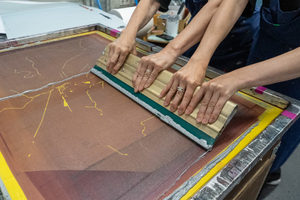"HfG Website"
| Begriff | HfG Website |
| Metakey | Freigabe Nutzung HfG (rights:usage_hfg) |
| Typ | Keyword |
| Vokabular | Rechte |
1863 Inhalte
- Seite 1 von 156
Dusting. Ecosystems with images and codes
- Titel
- Dusting. Ecosystems with images and codes
- Schlagworte
- Datierung
- 30.04.2024 - 16.07.2024
- Titel
- Dusting. Ecosystems with images and codes
- Titel (en)
- Dusting. Ecosystems with images and codes
- Urheberrechtshinweis
- © Staatliche Hochschule für Gestaltung Karlsruhe, Foto: Matylda Eaton
- Freigabe Nutzung HfG
- Medienersteller/in
- Medien-Beschreibung
- Dokumentation des Seminars:
Dusting. Ecosystems with images and codes
“No matter how desperately you fight against it, dust pervades everything. It accumulates in fuzzy balls or gathers in even layers, adapting to the contours of things and making the passage of time. In itself, it is also a gathering place, a random community of what has been and what is yet to be, a catalog of traces, an inventory of threats, and a set of promises… “ Michael Marder, “Dust” 2016 In this seminar we will look at different situations with images and codes where dust engages as a medium to understand the complex interrelation between the content of an image and its making, its meta-data and its technological and ecological being in the world. The seminare is practical as well as theoretical. We will dust together, and we will wait for dust to settle: on paper, in space, in our minds, and we will research and engage in dust experiments together: from field trips to laboratory visit to exhibition visits. At the end of the seminar the aim is to have delevoped a presentation, be it an image series, an installation, or/ and a research exhibition. This will be presented during the Rundgang. Prof. Susanne Kriemann organises an excursion to Vienna 24th to 27th of April to see the exhibition “Into the Woods” at KunstHausWien and the first “Klima-Biennale”.
- Dokumentation des Seminars:
- Abgebildete Personen
- Projektleiter/in
- Semester
- Studiengang
- Importiert am
- 22.08.2024
- Übergeordnete Sets
- 1
Dusting. Ecosystems with images and codes
- Titel
- Dusting. Ecosystems with images and codes
- Schlagworte
- Datierung
- 30.04.2024 - 16.07.2024
- Titel
- Dusting. Ecosystems with images and codes
- Titel (en)
- Dusting. Ecosystems with images and codes
- Urheberrechtshinweis
- © Staatliche Hochschule für Gestaltung Karlsruhe, Foto: Matylda Eaton
- Rechtsschutz/Lizenz
- Freigabe Nutzung HfG
- Medienersteller/in
- Medien-Beschreibung
- Dokumentation des Seminars:
Dusting. Ecosystems with images and codes
“No matter how desperately you fight against it, dust pervades everything. It accumulates in fuzzy balls or gathers in even layers, adapting to the contours of things and making the passage of time. In itself, it is also a gathering place, a random community of what has been and what is yet to be, a catalog of traces, an inventory of threats, and a set of promises… “ Michael Marder, “Dust” 2016 In this seminar we will look at different situations with images and codes where dust engages as a medium to understand the complex interrelation between the content of an image and its making, its meta-data and its technological and ecological being in the world. The seminare is practical as well as theoretical. We will dust together, and we will wait for dust to settle: on paper, in space, in our minds, and we will research and engage in dust experiments together: from field trips to laboratory visit to exhibition visits. At the end of the seminar the aim is to have delevoped a presentation, be it an image series, an installation, or/ and a research exhibition. This will be presented during the Rundgang. Prof. Susanne Kriemann organises an excursion to Vienna 24th to 27th of April to see the exhibition “Into the Woods” at KunstHausWien and the first “Klima-Biennale”.
- Dokumentation des Seminars:
- Abgebildete Personen
- Projektleiter/in
- Semester
- Studiengang
- Importiert am
- 22.08.2024
- Übergeordnete Sets
- 2
Dusting. Ecosystems with images and codes
- Titel
- Dusting. Ecosystems with images and codes
- Schlagworte
- Datierung
- 30.04.2024 - 16.07.2024
- Titel
- Dusting. Ecosystems with images and codes
- Titel (en)
- Dusting. Ecosystems with images and codes
- Urheberrechtshinweis
- © Staatliche Hochschule für Gestaltung Karlsruhe, Foto: Matylda Eaton
- Rechtsschutz/Lizenz
- Freigabe Nutzung HfG
- Medienersteller/in
- Medien-Beschreibung
- Dokumentation des Seminars:
Dusting. Ecosystems with images and codes
“No matter how desperately you fight against it, dust pervades everything. It accumulates in fuzzy balls or gathers in even layers, adapting to the contours of things and making the passage of time. In itself, it is also a gathering place, a random community of what has been and what is yet to be, a catalog of traces, an inventory of threats, and a set of promises… “ Michael Marder, “Dust” 2016 In this seminar we will look at different situations with images and codes where dust engages as a medium to understand the complex interrelation between the content of an image and its making, its meta-data and its technological and ecological being in the world. The seminare is practical as well as theoretical. We will dust together, and we will wait for dust to settle: on paper, in space, in our minds, and we will research and engage in dust experiments together: from field trips to laboratory visit to exhibition visits. At the end of the seminar the aim is to have delevoped a presentation, be it an image series, an installation, or/ and a research exhibition. This will be presented during the Rundgang. Prof. Susanne Kriemann organises an excursion to Vienna 24th to 27th of April to see the exhibition “Into the Woods” at KunstHausWien and the first “Klima-Biennale”.
- Dokumentation des Seminars:
- Abgebildete Personen
- Projektleiter/in
- Semester
- Studiengang
- Importiert am
- 22.08.2024
- Übergeordnete Sets
- 2
Dusting. Ecosystems with images and codes
- Titel
- Dusting. Ecosystems with images and codes
- Schlagworte
- Datierung
- 30.04.2024 - 16.07.2024
- Titel
- Dusting. Ecosystems with images and codes
- Titel (en)
- Dusting. Ecosystems with images and codes
- Urheberrechtshinweis
- © Staatliche Hochschule für Gestaltung Karlsruhe, Foto: Matylda Eaton
- Freigabe Nutzung HfG
- Medienersteller/in
- Medien-Beschreibung
- Dokumentation des Seminars:
Dusting. Ecosystems with images and codes
“No matter how desperately you fight against it, dust pervades everything. It accumulates in fuzzy balls or gathers in even layers, adapting to the contours of things and making the passage of time. In itself, it is also a gathering place, a random community of what has been and what is yet to be, a catalog of traces, an inventory of threats, and a set of promises… “ Michael Marder, “Dust” 2016 In this seminar we will look at different situations with images and codes where dust engages as a medium to understand the complex interrelation between the content of an image and its making, its meta-data and its technological and ecological being in the world. The seminare is practical as well as theoretical. We will dust together, and we will wait for dust to settle: on paper, in space, in our minds, and we will research and engage in dust experiments together: from field trips to laboratory visit to exhibition visits. At the end of the seminar the aim is to have delevoped a presentation, be it an image series, an installation, or/ and a research exhibition. This will be presented during the Rundgang. Prof. Susanne Kriemann organises an excursion to Vienna 24th to 27th of April to see the exhibition “Into the Woods” at KunstHausWien and the first “Klima-Biennale”.
- Dokumentation des Seminars:
- Abgebildete Personen
- Projektleiter/in
- Semester
- Studiengang
- Importiert am
- 22.08.2024
- Übergeordnete Sets
- 1
Dusting. Ecosystems with images and codes
- Titel
- Dusting. Ecosystems with images and codes
- Schlagworte
- Datierung
- 30.04.2024 - 16.07.2024
- Titel
- Dusting. Ecosystems with images and codes
- Titel (en)
- Dusting. Ecosystems with images and codes
- Urheberrechtshinweis
- © Staatliche Hochschule für Gestaltung Karlsruhe, Foto: Matylda Eaton
- Rechtsschutz/Lizenz
- Freigabe Nutzung HfG
- Medienersteller/in
- Medien-Beschreibung
- Dokumentation des Seminars:
Dusting. Ecosystems with images and codes
“No matter how desperately you fight against it, dust pervades everything. It accumulates in fuzzy balls or gathers in even layers, adapting to the contours of things and making the passage of time. In itself, it is also a gathering place, a random community of what has been and what is yet to be, a catalog of traces, an inventory of threats, and a set of promises… “ Michael Marder, “Dust” 2016 In this seminar we will look at different situations with images and codes where dust engages as a medium to understand the complex interrelation between the content of an image and its making, its meta-data and its technological and ecological being in the world. The seminare is practical as well as theoretical. We will dust together, and we will wait for dust to settle: on paper, in space, in our minds, and we will research and engage in dust experiments together: from field trips to laboratory visit to exhibition visits. At the end of the seminar the aim is to have delevoped a presentation, be it an image series, an installation, or/ and a research exhibition. This will be presented during the Rundgang. Prof. Susanne Kriemann organises an excursion to Vienna 24th to 27th of April to see the exhibition “Into the Woods” at KunstHausWien and the first “Klima-Biennale”.
- Dokumentation des Seminars:
- Abgebildete Personen
- Projektleiter/in
- Semester
- Studiengang
- Importiert am
- 22.08.2024
- Übergeordnete Sets
- 2
Dusting. Ecosystems with images and codes
- Titel
- Dusting. Ecosystems with images and codes
- Schlagworte
- Datierung
- 30.04.2024 - 16.07.2024
- Titel
- Dusting. Ecosystems with images and codes
- Titel (en)
- Dusting. Ecosystems with images and codes
- Urheberrechtshinweis
- © Staatliche Hochschule für Gestaltung Karlsruhe, Foto: Matylda Eaton
- Freigabe Nutzung HfG
- Medienersteller/in
- Medien-Beschreibung
- Dokumentation des Seminars:
Dusting. Ecosystems with images and codes
“No matter how desperately you fight against it, dust pervades everything. It accumulates in fuzzy balls or gathers in even layers, adapting to the contours of things and making the passage of time. In itself, it is also a gathering place, a random community of what has been and what is yet to be, a catalog of traces, an inventory of threats, and a set of promises… “ Michael Marder, “Dust” 2016 In this seminar we will look at different situations with images and codes where dust engages as a medium to understand the complex interrelation between the content of an image and its making, its meta-data and its technological and ecological being in the world. The seminare is practical as well as theoretical. We will dust together, and we will wait for dust to settle: on paper, in space, in our minds, and we will research and engage in dust experiments together: from field trips to laboratory visit to exhibition visits. At the end of the seminar the aim is to have delevoped a presentation, be it an image series, an installation, or/ and a research exhibition. This will be presented during the Rundgang. Prof. Susanne Kriemann organises an excursion to Vienna 24th to 27th of April to see the exhibition “Into the Woods” at KunstHausWien and the first “Klima-Biennale”.
- Dokumentation des Seminars:
- Abgebildete Personen
- Projektleiter/in
- Semester
- Studiengang
- Importiert am
- 22.08.2024
- Übergeordnete Sets
- 1
Dusting. Ecosystems with images and codes
- Titel
- Dusting. Ecosystems with images and codes
- Schlagworte
- Datierung
- 30.04.2024 - 16.07.2024
- Titel
- Dusting. Ecosystems with images and codes
- Titel (en)
- Dusting. Ecosystems with images and codes
- Urheberrechtshinweis
- © Staatliche Hochschule für Gestaltung Karlsruhe, Foto: Matylda Eaton
- Rechtsschutz/Lizenz
- Freigabe Nutzung HfG
- Medienersteller/in
- Medien-Beschreibung
- Dokumentation des Seminars:
Dusting. Ecosystems with images and codes
“No matter how desperately you fight against it, dust pervades everything. It accumulates in fuzzy balls or gathers in even layers, adapting to the contours of things and making the passage of time. In itself, it is also a gathering place, a random community of what has been and what is yet to be, a catalog of traces, an inventory of threats, and a set of promises… “ Michael Marder, “Dust” 2016 In this seminar we will look at different situations with images and codes where dust engages as a medium to understand the complex interrelation between the content of an image and its making, its meta-data and its technological and ecological being in the world. The seminare is practical as well as theoretical. We will dust together, and we will wait for dust to settle: on paper, in space, in our minds, and we will research and engage in dust experiments together: from field trips to laboratory visit to exhibition visits. At the end of the seminar the aim is to have delevoped a presentation, be it an image series, an installation, or/ and a research exhibition. This will be presented during the Rundgang. Prof. Susanne Kriemann organises an excursion to Vienna 24th to 27th of April to see the exhibition “Into the Woods” at KunstHausWien and the first “Klima-Biennale”.
- Dokumentation des Seminars:
- Abgebildete Personen
- Projektleiter/in
- Semester
- Studiengang
- Importiert am
- 22.08.2024
- Übergeordnete Sets
- 2
Dusting. Ecosystems with images and codes
- Titel
- Dusting. Ecosystems with images and codes
- Schlagworte
- Datierung
- 30.04.2024 - 16.07.2024
- Titel
- Dusting. Ecosystems with images and codes
- Titel (en)
- Dusting. Ecosystems with images and codes
- Urheberrechtshinweis
- © Staatliche Hochschule für Gestaltung Karlsruhe, Foto: Matylda Eaton
- Rechtsschutz/Lizenz
- Freigabe Nutzung HfG
- Medienersteller/in
- Medien-Beschreibung
- Dokumentation des Seminars:
Dusting. Ecosystems with images and codes
“No matter how desperately you fight against it, dust pervades everything. It accumulates in fuzzy balls or gathers in even layers, adapting to the contours of things and making the passage of time. In itself, it is also a gathering place, a random community of what has been and what is yet to be, a catalog of traces, an inventory of threats, and a set of promises… “ Michael Marder, “Dust” 2016 In this seminar we will look at different situations with images and codes where dust engages as a medium to understand the complex interrelation between the content of an image and its making, its meta-data and its technological and ecological being in the world. The seminare is practical as well as theoretical. We will dust together, and we will wait for dust to settle: on paper, in space, in our minds, and we will research and engage in dust experiments together: from field trips to laboratory visit to exhibition visits. At the end of the seminar the aim is to have delevoped a presentation, be it an image series, an installation, or/ and a research exhibition. This will be presented during the Rundgang. Prof. Susanne Kriemann organises an excursion to Vienna 24th to 27th of April to see the exhibition “Into the Woods” at KunstHausWien and the first “Klima-Biennale”.
- Dokumentation des Seminars:
- Abgebildete Personen
- Projektleiter/in
- Semester
- Studiengang
- Importiert am
- 22.08.2024
- Übergeordnete Sets
- 2
Dusting. Ecosystems with images and codes
- Titel
- Dusting. Ecosystems with images and codes
- Schlagworte
- Datierung
- 30.04.2024 - 16.07.2024
- Titel
- Dusting. Ecosystems with images and codes
- Titel (en)
- Dusting. Ecosystems with images and codes
- Urheberrechtshinweis
- © Staatliche Hochschule für Gestaltung Karlsruhe; Matylda Eaton
- Freigabe Nutzung HfG
- Medienersteller/in
- Medien-Beschreibung
- Dokumentation des Seminars:
Dusting. Ecosystems with images and codes
“No matter how desperately you fight against it, dust pervades everything. It accumulates in fuzzy balls or gathers in even layers, adapting to the contours of things and making the passage of time. In itself, it is also a gathering place, a random community of what has been and what is yet to be, a catalog of traces, an inventory of threats, and a set of promises… “ Michael Marder, “Dust” 2016 In this seminar we will look at different situations with images and codes where dust engages as a medium to understand the complex interrelation between the content of an image and its making, its meta-data and its technological and ecological being in the world. The seminare is practical as well as theoretical. We will dust together, and we will wait for dust to settle: on paper, in space, in our minds, and we will research and engage in dust experiments together: from field trips to laboratory visit to exhibition visits. At the end of the seminar the aim is to have delevoped a presentation, be it an image series, an installation, or/ and a research exhibition. This will be presented during the Rundgang. Prof. Susanne Kriemann organises an excursion to Vienna 24th to 27th of April to see the exhibition “Into the Woods” at KunstHausWien and the first “Klima-Biennale”.
- Dokumentation des Seminars:
- Abgebildete Personen
- Projektleiter/in
- Semester
- Studiengang
- Importiert am
- 22.08.2024
- Übergeordnete Sets
- 1
Dusting. Ecosystems with images and codes
- Titel
- Dusting. Ecosystems with images and codes
- Schlagworte
- Datierung
- 30.04.2024 - 16.07.2024
- Titel
- Dusting. Ecosystems with images and codes
- Titel (en)
- Dusting. Ecosystems with images and codes
- Urheberrechtshinweis
- © Staatliche Hochschule für Gestaltung Karlsruhe, Foto: Matylda Eaton
- Freigabe Nutzung HfG
- Medienersteller/in
- Medien-Beschreibung
- Dokumentation des Seminars:
Dusting. Ecosystems with images and codes
“No matter how desperately you fight against it, dust pervades everything. It accumulates in fuzzy balls or gathers in even layers, adapting to the contours of things and making the passage of time. In itself, it is also a gathering place, a random community of what has been and what is yet to be, a catalog of traces, an inventory of threats, and a set of promises… “ Michael Marder, “Dust” 2016 In this seminar we will look at different situations with images and codes where dust engages as a medium to understand the complex interrelation between the content of an image and its making, its meta-data and its technological and ecological being in the world. The seminare is practical as well as theoretical. We will dust together, and we will wait for dust to settle: on paper, in space, in our minds, and we will research and engage in dust experiments together: from field trips to laboratory visit to exhibition visits. At the end of the seminar the aim is to have delevoped a presentation, be it an image series, an installation, or/ and a research exhibition. This will be presented during the Rundgang. Prof. Susanne Kriemann organises an excursion to Vienna 24th to 27th of April to see the exhibition “Into the Woods” at KunstHausWien and the first “Klima-Biennale”.
- Dokumentation des Seminars:
- Abgebildete Personen
- Projektleiter/in
- Semester
- Studiengang
- Importiert am
- 22.08.2024
- Übergeordnete Sets
- 1
Dusting. Ecosystems with images and codes
- Titel
- Dusting. Ecosystems with images and codes
- Schlagworte
- Datierung
- 30.04.2024 - 16.07.2024
- Titel
- Dusting. Ecosystems with images and codes
- Titel (en)
- Dusting. Ecosystems with images and codes
- Urheberrechtshinweis
- © Staatliche Hochschule für Gestaltung Karlsruhe, Foto: Matylda Eaton
- Freigabe Nutzung HfG
- Medienersteller/in
- Medien-Beschreibung
- Dokumentation des Seminars:
Dusting. Ecosystems with images and codes
“No matter how desperately you fight against it, dust pervades everything. It accumulates in fuzzy balls or gathers in even layers, adapting to the contours of things and making the passage of time. In itself, it is also a gathering place, a random community of what has been and what is yet to be, a catalog of traces, an inventory of threats, and a set of promises… “ Michael Marder, “Dust” 2016 In this seminar we will look at different situations with images and codes where dust engages as a medium to understand the complex interrelation between the content of an image and its making, its meta-data and its technological and ecological being in the world. The seminare is practical as well as theoretical. We will dust together, and we will wait for dust to settle: on paper, in space, in our minds, and we will research and engage in dust experiments together: from field trips to laboratory visit to exhibition visits. At the end of the seminar the aim is to have delevoped a presentation, be it an image series, an installation, or/ and a research exhibition. This will be presented during the Rundgang. Prof. Susanne Kriemann organises an excursion to Vienna 24th to 27th of April to see the exhibition “Into the Woods” at KunstHausWien and the first “Klima-Biennale”.
- Dokumentation des Seminars:
- Abgebildete Personen
- Projektleiter/in
- Semester
- Studiengang
- Importiert am
- 22.08.2024
- Übergeordnete Sets
- 1
Dusting. Ecosystems with images and codes
- Titel
- Dusting. Ecosystems with images and codes
- Schlagworte
- Datierung
- 30.04.2024 - 16.07.2024
- Titel
- Dusting. Ecosystems with images and codes
- Titel (en)
- Dusting. Ecosystems with images and codes
- Urheberrechtshinweis
- © Staatliche Hochschule für Gestaltung Karlsruhe, Foto: Matylda Eaton
- Rechtsschutz/Lizenz
- Freigabe Nutzung HfG
- Medienersteller/in
- Medien-Beschreibung
- Dokumentation des Seminars:
Dusting. Ecosystems with images and codes
“No matter how desperately you fight against it, dust pervades everything. It accumulates in fuzzy balls or gathers in even layers, adapting to the contours of things and making the passage of time. In itself, it is also a gathering place, a random community of what has been and what is yet to be, a catalog of traces, an inventory of threats, and a set of promises… “ Michael Marder, “Dust” 2016 In this seminar we will look at different situations with images and codes where dust engages as a medium to understand the complex interrelation between the content of an image and its making, its meta-data and its technological and ecological being in the world. The seminare is practical as well as theoretical. We will dust together, and we will wait for dust to settle: on paper, in space, in our minds, and we will research and engage in dust experiments together: from field trips to laboratory visit to exhibition visits. At the end of the seminar the aim is to have delevoped a presentation, be it an image series, an installation, or/ and a research exhibition. This will be presented during the Rundgang. Prof. Susanne Kriemann organises an excursion to Vienna 24th to 27th of April to see the exhibition “Into the Woods” at KunstHausWien and the first “Klima-Biennale”.
- Dokumentation des Seminars:
- Abgebildete Personen
- Projektleiter/in
- Semester
- Studiengang
- Importiert am
- 22.08.2024
- Übergeordnete Sets
- 2
